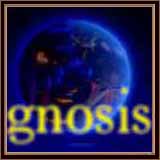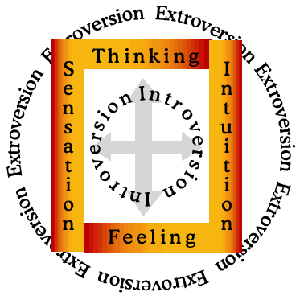 JUNG'S TYPE THEORY
JUNG'S TYPE THEORY JUNG'S TYPE THEORY
JUNG'S TYPE THEORY
IN CATEGORIZING PERSONALITY, Jung saw delineations between different sorts of behaviors and inclinations. He noticed that two attitudes described the direction of the libido flow -- either inward (towards the subject) or outwards (towards the object). In describing these two attitude types, Jung helped popularize the terms introvert and extrovert that are now a part of every-day language.
Besides these sweeping tendencies, Jung also saw differences in how people absorbed and processed information. He described the perceiving (absorption) functions as sensation vs intuition, while the judgmental (processing) functions were thinking vs feeling. [The judgmental functions of thinking and feeling are also called rational functions, since they evaluate data. The perceiving functions of sensation and intuition are called irrational functions, since they only gather data but do not evaluate it.]

Coupled with the introvert and extrovert tendencies, Jung arrived at eight different general personality categories:
___Introversion/Extroversion (In-nie or Out-ie?)________
Jung provides interesting commentary on the extrovert and introvert inclinations, in the manner in which the psychological relates to the biological:
This biological difference, it seems to me, is not merely analogous to, but the actual foundation of, our two psychological modes of adaptation....It is sufficient to note that the peculiar nature of the extravert constantly urges him to expend and propagate himself in every way, while the tendency of the introvert is to defend himself against all demands from outside, to conserve his energy by withdrawing it from objects, thereby consolidating his own position. Blake's intuition did not err when he described the two classes of men as "prolific" and "devouring".
Jung also strongly proposed that both attitudes were inborn qualities, since there seemed to be no way to explain the fact that the same mother could give birth to both sorts of children without changing her initial mothering behavior. (Logically, if the mothering and other strong factors remain stable but the children are extremely different virtually from birth, the source of the difference must rest within the child and not within the environment.)
Although Jung does allow that people can be trained "against grain" (such as forcing an intravert to be extroverted, or oppressing an extravert so that he is conditioned to withdraw), forcing such personality modification causes the individual a great deal of stress and exhaustion that can only be removed when the innate tendency is allowed to predominate.
In my own life, I've seen this drama played out between myself (an introverted thinker) and a good friend who is an extroverted intuitive. Having to "defend" myself against the verbal and physical proliferations of extroverts runs me quickly into the ground. With solitude as my natural habitat, social gatherings are somewhat "hostile" terrain into which I can only venture periodically, and never without cost to my energy level. My friend, on the other hand, almost goes hyperactive if forced to spend time alone. For example, when left in his work cubicle to his own devices, he would invariably grab his coffee mug and venture forth into the halls, looking for someone to waylay for a good conversation.
My own children are also strong defense for Jung's concept of inborn attitude. Almost from birth, one has expressed strong introverted tendencies and the other strong extrovert tendencies. (The first could be left alone and would wait patiently, absorbed in himself. The other demanded to be around people, lit up when someone entered the room, and could never afford to be "idle" -- always wanting to interact somehow with the environment.) A two-person study does not a theory prove, but I've seen the same tendencies in other extremely young children as well.
___Self-Analysis: The Introverted Thinker___________
I fit under Jung's category of Introverted Thinker -- the same category in which Jung placed himself. One of Jung's most interesting assertions is that the introverted thinker (as compared to the extroverted thinker) places emphasis on the subjective personal element, rather than the objective outside element:
In other words, introverted thinking begins with the individual, who looks to the outer world for justification, and then takes the data for compilation back inside the psyche -- applying it to the desired theory. The extraverted thinker begins with the outside world (i.e., observing what is around him -- whether concrete or abstract, such as a rock or accepted political theory), draws it inside for assembly, then spits it back out again in object-oriented rather than personal terms. Jung describes the two sorts of thought as foes, in a sense:
When I am involved in discussions -- communications between two often dissimilar people -- I place a large emphasis on objective experience (that which can be supported by apparent fact) rather than subjective experience (that which can only be shared -- not supported by apparent fact). This is due to the fact that the purpose of discussion is to reach an agreement about what makes sense, and observable facts are the only things that can be agreed upon by both parties. Subjective experiences in themselves can not be proven and thus are not sturdy support beams for arguments unless one's partner is predisposed to accept the experience. In this case, I consider myself objective.
Jung seems to define the two terms slightly differently, where subjective means "inward" and objective means "outward". Going by Jung's definition, my subjective introverted filter -- through which all input must pass -- makes my viewpoint subjective, not objective. Essentially, data untouched, or unassembled, by the human mind is the only objective data. And data that has been interpreted and lent meaning is not objective any longer, but subjective (according to Jung). By searching for meaning within and beyond the data, I've inadvertently added a subjective element -- me -- into the process. Does data exist for its own purposes, or to be assembled into some other purpose? Perhaps that is the best description of objective vs subjective.
Jung points out (rightly) that the human mind cannot really function with both the objective and subjective elements -- that neither element is incorrect in itself, but only the extremes of each element. Completely objective data has no relevance to the observer, while completely subjective data might have no connection to "reality" (or the outer, concrete physical world).
Introverted thinking expresses a strong detachment from objects [things, people, traditional concepts] in the outer world. In the end, the formulation of truth is all that really matters, and neither feelings, outside considerations, nor social bonds can interfere with this process. Admittedly, when people are treated in this fashion, they sometimes feel ignored, disliked, or even worthless in the eyes of the introverted thinker.
Introverted thinkers tend to do poorly "dressing up" their ideas for public consumption. An idea is expressed in blunt completeness, since the idea's truth should be obvious to everyone, and since to "sell" the idea would demand that it be diluted or tainted in some way -- ruining its perfection.
Jung goes onward to describe the introverted thinker's relationships with others, as well as what happens when the type becomes extreme. The noted decline remarkably parallels the disintegration of Enneagram theory's equivalent personality type (the Five, or Thinker).
Excerpts from Jung's Psychological Types
There are in nature two fundamentally different modes of adaptation which ensure the continued existence of the living organism. The one costs in a high rate of fertility, with low powers of defence and short duration of life for the single individual, while the other consists in equipping the individual with numerous means of self-preservation plus a low fertility rate.
At the very least, the subjective factor expresses itself as a feeling of guidance which ultimately determines judgment. Sometimes it appears as a more or less complete image which serves as a criterion. But whether introverted thinking is concerned with concrete or abstract objects, always at the decisive points it is oriented by subjective data. It does not lead from concrete experience back again to the object, but always to the subjective element.
Introverted thinking then appears as something quite arbitrary, while extraverted thinking seems dull and banal. Thus the two orientations are incessantly at war.
The extravert's intense relation to objects is almost lacking [in the introverted thinker]... If the object is a person, this person has the weird feeling that he only matters in a negative way; in milder cases, he is merely conscious of being [superfluous] but with a more extreme type he feels himself warded off as something definitely disturbing... Everything about him tends to disappear and get concealed. His judgment appears cold, inflexible, arbitrary, and ruthless... it always bypasses the object and leaves one with a feeling of the [thinker]'s superiority. He may be polite, amiable, and kind, but one is constantly aware of a certain uneasiness betraying an ulterior motive -- the disarming of an opponent, who must at all costs be pacified and placated lest he prove himself a nuisance.
... Making ideas objective reality... goes against the grain. And when he puts his ideas into the world, he... simply dumps them there and gets annoyed if they fail to thrive on their own accord. His amazing unpracticalness and horror of publicity in any form have a hand in this. If in his eyes his product appears correct and true, then it must be so in practice, and others have got to bow to its truth. Hardly will he ever go out of his way to win anyone's appreciation of it, especially anyone of influence.
![]()
![]()
![]()
![]()
![]()
![]()